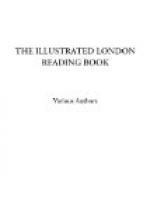The celebrated patriot, John Hampden, was descended from an ancient family in Buckinghamshire, where he was born in 1594. On leaving the University, he entered the inns of court, where he made considerable progress in the study of the law. He was chosen to serve in the Parliament which assembled at Westminster, February, 1626, and served in all the succeeding Parliaments in the reign of Charles I. That Monarch having quarrelled with his Parliament, was obliged to have recourse to the open exercise of his prerogative in order to supply himself with money. From the nobility he desired assistance; from the City of London he required a loan of L100,000. The former contributed but slowly; the latter at length gave a flat denial. To equip a fleet, an apportionment was made, by order of the Council, amongst all the maritime towns, each of which was required, with the assistance of the adjoining counties, to furnish a certain number of vessels or amount of shipping. The City of London was rated at twenty ships. And this was the first appearance in the present reign of ship-money—a taxation which had once been imposed by Elizabeth, on a great emergency, but which, revived and carried further by Charles, produced the most violent discontent.
[Illustration: STATUE OF JOHN HAMPDEN.]
In 1636, John Hampden became universally known by his intrepid opposition to the ship-money, as an illegal tax. Upon this he was prosecuted, and his conduct throughout the transaction gained him great credit and reputation. When the Long Parliament began, the eyes of all were fixed upon him as the father of his country. On the 3rd of January, 1642, the King ordered articles of high treason, and other misdemeanours, to be prepared against Lord Kimbolton, Mr. Hampden, and four other members of the House of Commons, and went to the House to seize them, but they had retired. Mr. Hampden afterwards made a celebrated speech in the House to clear himself from the charge brought against him.
In the beginning of the civil war Hampden commanded a regiment of foot, and did good service at the battle of Edgehill; but he received a mortal wound in an engagement with Prince Rupert, in Chalgrave-field, in Oxfordshire, and died in 1648. Hampden is said to have possessed in a high degree talents for gaining and preserving popular influence, and great courage, industry, and strength of mind, which procured him great ascendancy over other men.
* * * * *
OTHELLO’S HISTORY.
[Illustration: Letter H.]
Her father loved me; oft invited
me;
Still question’d me
the story of my life,
From year to year: the
battles, sieges, fortunes,
That I have past.
I ran it through, even from
my boyish days
To the very moment that he
bade me tell it.
Wherein I spake of most disastrous
chances,




